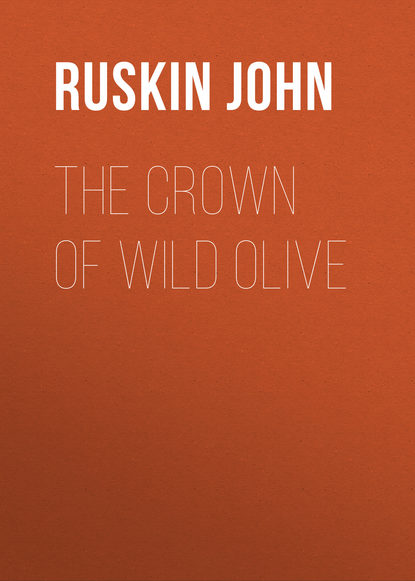По всем вопросам обращайтесь на: info@litportal.ru
(©) 2003-2024.
✖
The Crown of Wild Olive
Автор
Год написания книги
2018
Настройки чтения
Размер шрифта
Высота строк
Поля
179
'Gunpowder is one of the greatest inventions of modern times, and what has given such a superiority to civilised nations over barbarous'! (Evenings at Home—fifth evening.) No man can owe more than I both to Mrs. Barbauld and Miss Edgeworth; and I only wish that in the substance of what they wisely said, they had been more listened to. Nevertheless, the germs of all modern conceit and error respecting manufacture and industry, as rivals to Art and to Genius, are concentrated in 'Evenings at Home' and 'Harry and Lucy'—being all the while themselves works of real genius, and prophetic of things that have yet to be learned and fulfilled. See for instance the paper, 'Things by their Right Names,' following the one from which I have just quoted (The Ship), and closing the first volume of the old edition of the Evenings.
180
Carlyle, French Revolution (Chapman, 1869), vol. ii. p. 70; conf. p. 25, and the Ça ira at Arras, vol. iii. p. 276.
181
Ibid. iii. 26.
182
Carlyle, French Revolution, iii. 106, the last sentence altered in a word or two.
183
I have been greatly disappointed, in taking soundings of our most majestic mountain pools, to find them, in no case, verge on the unfathomable.
184
'It must be put by the original, stanza for stanza, and verse for verse; and you will see what was permitted in a Catholic country and a bigoted age to Churchmen, on the score of Religion—and so tell those buffoons who accuse me of attacking the Liturgy.
'I write in the greatest haste, it being the hour of the Corso, and I must go and buffoon with the rest. My daughter Allegra is just gone with the Countess G. in Count G.'s coach and six. Our old Cardinal is dead, and the new one not appointed yet—but the masquing goes on the same.' (Letter to Murray, 355th in Moore, dated Ravenna, Feb. 7, 1828.) 'A dreadfully moral place, for you must not look at anybody's wife, except your neighbour's.'
185
See quoted infra the mock, by Byron, of himself and all other modern poets, Juan, canto iii. stanza 86, and compare canto xiv. stanza 8. In reference of future quotations the first numeral will stand always for canto; the second for stanza; the third, if necessary, for line.
186
Island, ii. 16, where see context.
187
Juan, viii. 5; but, by your Lordship's quotation, Wordsworth says 'instrument'—not 'daughter.' Your Lordship had better have said 'Infant' and taken the Woolwich authorities to witness: only Infant would not have rymed.
188
Juan, viii. 3; compare 14 and 63, with all its lovely context 61—68: then 82, and afterwards slowly and with thorough attention, the Devil's speech, beginning, 'Yes, Sir, you forget' in scene 2 of The Deformed Transformed: then Sardanapalus's, act i. scene 2, beginning 'he is gone, and on his finger bears my signet,' and finally, the Vision of Judgment, stanzas 3 to 5.
189
Island, iii. 3, and compare, of shore surf, the 'slings its high flakes, shivered into sleet' of stanza 7.
190
A modern editor—of whom I will not use the expressions which occur to me—finding the 'we' a redundant syllable in the iambic line, prints 'we're.' It is a little thing—but I do not recollect, in the forty years of my literary experience, any piece of editor's retouch quite so base. But I don't read the new editions much; that must be allowed for.
191
Island, ii. 5. I was going to say, 'Look to the context.' but am fain to give it here; for the stanza, learned by heart, ought to be our school-introduction to the literature of the world.
'Such was this ditty of Tradition's days,
Which to the dead a lingering fame conveys
In song, where fame as yet hath left no sign
Beyond the sound whose charm is half divine;
Which leaves no record to the sceptic eye,
But yields young history all to harmony;
A boy Achilles, with the centaur's lyre
In hand, to teach him to surpass his sire.
For one long-cherish'd ballad's simple stave
Rung from the rock, or mingled with the wave,
Or from the bubbling streamlet's grassy side,
Or gathering mountain echoes as they glide,
Hath greater power o'er each true heart and ear,
Than all the columns Conquest's minions rear;
Invites, when hieroglyphics are a theme
For sages' labours or the student's dream;
Attracts, when History's volumes are a toil—
The first, the freshest bud of Feeling's soil.
Such was this rude rhyme—rhyme is of the rude,
But such inspired the Norseman's solitude,
Who came and conquer'd; such, wherever rise
Lands which no foes destroy or civilise,
Exist; and what can our accomplish'd art
Of verse do more than reach the a waken'd heart?'
192
Shepherd's Calendar. 'Coronatiön,' loyal-pastoral for Carnation; 'sops in wine,' jolly-pastoral for double pink; 'paunce,' thoughtless pastoral for pansy; 'chevisaunce' I don't know, (not in Gerarde); 'flowre-delice'—pronounce dellice—half made up of 'delicate' and 'delicious.'
193
Herrick, Dirge for Jephthah's Daughter.
194
Passionate Pilgrim.
195
In this point, compare the Curse of Minerva with the Tears of the Muses.
196
'He,'—Lucifer; (Vision of Judgment, 24). It is precisely because Byron was not his servant, that he could see the gloom. To the Devil's true servants, their Master's presence brings both cheerfulness and prosperity;—with a delightful sense of their own wisdom and virtue; and of the 'progress' of things in general:—in smooth sea and fair weather,—and with no need either of helm touch, or oar toil: as when once one is well within the edge of Maelstrom.











